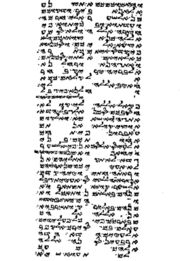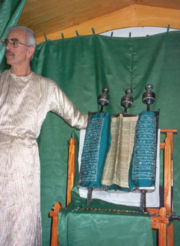
Samaritan Text

Samaritan and the Samaritan Torah
The Samaritan Pentateuch is a version of the Pentateuch or Torah (the first five books of the Hebrew Bible) that is used by the Samaritans.
Scholars consult the Samaritan Pentateuch when trying to determine the meaning of text of the original Pentateuch and to trace the development of text-families. Scrolls among the Dead Sea scrolls have been identified as proto-Samaritan Pentateuch text-type.[1]
Samaritan practices are based on their version of the Five Books of Moses, which is slightly different from the Jewish or Christian texts. Some differences are minor, such as the ages of different people mentioned in bibliography, while others are major, such as the commandment to be monogamous which appears in the Samaritan text. (cf Lev 18:18)
There is a special importance in the Abishua Scroll, which is used in the Samaritan synagogue of Nablus, and was allegedly penned by Abisha, great-grandson of Aaron, the brother of Moses thirteen years after the entry into the land of Israel under the leadership of Joshua, son of Nun.
Background[]
Samaritans claim that they are descended from the northern Israelite kingdom of Israel. There was a political division between the southern kingdom of Judah and northern kingdom of Israel, which took place during David and Solomon kingdom. They maintain that the northern kingdom, the capital of which was Samaria, never joined the kingdom of David and Solomon. Eventually the northern kingdom was conquered by the Assyrians, and the southern by the Babylonians.
Today's Samaritans are the remnants of those who were not exiled from the land during the Assyrian period, and continuously practiced the ancient religion of Moses and passed it down even in the most difficult oppressed times.
Samaritans do not accept the oral law of the Jews (from southern kingdom), namely the Talmud that Jews practiced after their return from the Babylonian exile (before destruction of the Second Temple). They use their own oral law, which has been practiced over the generations; and which they believe is the original practice that Moses taught the children of Israel at Mount Sinai assembly. There have been numerous wars between Jews and Samaritans in history.
Differences with the Masoretic text[]
The Samaritan Pentateuch is written in the Samaritan alphabet, which differs from the Hebrew alphabet, and was the form in general use before the Babylonian captivity. There are other peculiarities in the writing.
It is claimed that there are significant differences between the Hebrew and the Samaritan versions in the readings of many sentences. In about two thousand out of the six thousand instances in which the Samaritan and the Jewish texts (Masoretic text) differ, the Septuagint (LXX) agrees with the Samaritan. For example, Exodus 12:40 in the Samaritan and the LXX reads:
- "Now the sojourning of the children of Israel and of their fathers which they had dwelt in the land of Canaan and in Egypt was four hundred and thirty years."
In the Masoretic text, the passage reads:
- "Now the sojourning of the children of Israel, who dwelt in Egypt, was four hundred and thirty years." (Exodus 12:40)
The Samaritan version of the Ten Commandments commands them to build the altar on Mount Gerizim, which would be the site at which all sacrifices should be offered. [2]
Wider interest in the Samaritan Pentateuch commenced in 1616, when the well-known traveler Pietro della Valle brought from Damascus a copy of the text. Since then many copies have come to Europe and America. In 1645, an edited copy of the text was published in the Le Jay's (Paris) Polyglot by Jean Morin, a Jesuit-convert from Calvinism to Catholicism, who believed (without actual scholarly support) that the Septuagint and the Samaritan texts were superior to the Hebrew Masoretic text. It was republished again in Walton's Polyglot in 1657.
Scholarly evaluation of the Samaritan Pentateuch has changed after the discovery of the Dead Sea Scrolls, some manuscripts of which display a text that corresponds closely to that of the Samaritan Pentateuch. This shows that, apart from the clearly Samaritan references to the worship of God on Mount Gerizim, the distinction at that date between the Samaritan and non-Samaritan versions was not as clear-cut as previously thought.
The first English translation of the Samaritan text is expected to be published by late 2008 by Benyamim Tsedaka, an active member of the Samaritan community.
See also[]
References[]
- ↑ The Canon Debate, McDonald & Sanders editors, 2002, chapter 6: Questions of Canon through the Dead Sea Scrolls by James C. VanderKam, page 94, citing private communication with Emanuel Tov on biblical manuscripts: Qumran scribe type c.25%, proto-Masoretic Text c. 40%, pre-Samaritan texts c.5%, texts close to the Hebrew model for the Septuagint c.5% and nonaligned c.25%.
- ↑ Overview of the Differences Between the Jewish and Samaritan Versions of the Pentateuch
External links[]
This entry incorporates text from the public domain Easton's Bible Dictionary, originally published in 1897.
